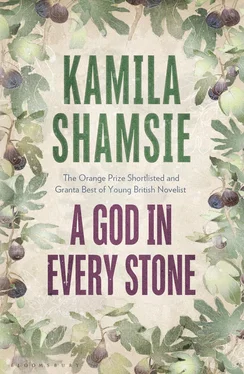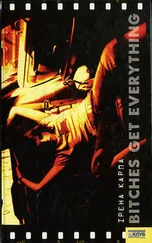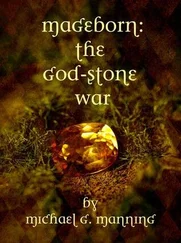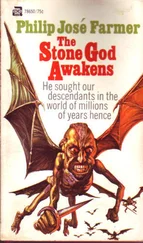They reached another gateway, this one leading out of the Walled City — immediately the noise and rush fell away and they entered a rural world with cultivated fields on either side of a bumpy road. Somewhere in the middle of those fields was the Great Stupa of Kanishka.
Once there was the Great Stupa, seven hundred feet tall. From every point in the Peshawar Valley men and women could look up from the dust of their days to see the pillar ringed with gold which arose from its uppermost canopy of pearls. Surrounding the Stupa, a vast monastery complex. Everywhere a traveller looked there was the Buddha, carved over and over into and around the countryside, in an age when the people of this region had the vision to find the god in every stone. His serene eyes observing everything — here carved of white stone, and there of a reddish-blue which mysteriously turned golden when the sun touched it, and elsewhere the grey of Gandhara.
Now there was devastation cut into wheat fields. The low mound that was the remains of the Great Stupa lay abandoned, the earth around it pockmarked with trial pits and trenches, miniature stupas and rubble. The stupas were badly damaged, their carvings lacking the delicacy of the Gandhara statuary Viv had seen in the British Museum. And the long grass made it clear no one had been here in a long while. This was a place archaeologists had given up on. Too much of it destroyed, too little of value in what remained, to make recovery worthwhile. She wiped a trail of sweat off her neck; the familiarity of the morning’s heat had passed and now the sun burnt so brightly it had turned the sky white.
— Miss Spencer!
An echoing quality to the boy’s voice directed her to the largest of the trenches. She hurried over, scolding herself for not keeping an eye on him. When she looked into the trench she saw it had been dug deep to reveal part of a wall decorated with stucco figures of the Buddha — the boy, replicating the Buddha’s cross-legged pose, was gently stroking the knee of the Enlightened One. From now on when she heard the word ‘trench’ she wanted only to think of this. He turned towards her, grinning a huge grin as if he had been the one to discover the stucco figures. There were steps carved into the trench and she was soon crouching beside the boy. Reaching out, she touched the Buddha’s face, a shiver travelling all the way through her.
— If you like this, you should see what they have at the Museum.
— We can go there? Now?
— Don’t you have somewhere to be? School?
— Summer holidays.
— And your family won’t worry about you if you’re gone too long?
The words tugged all expressiveness off his face. Viv wondered what ‘family’ might mean to him, and why he’d been alone at a train station the previous morning. Best not to make any of that her business.
She looked at her watch. The previous evening, a couple in Dean’s dining room had introduced themselves as the Forbeses, apologised for not being at the train station to meet her — they’d been expecting her to send a telegram from Karachi to let them know which train she’d be on — and asked her to come to their home for lunch. Of course she’d be delighted, she’d said, and not only out of a sense of obligation; there was something about Mr Forbes — the manner of a medical professional perhaps — which she liked immensely, though the wife seemed a little on the nervy side.
— We can go there, but not now. Come to Dean’s again tomorrow.
It was evening already when she shook off the heaviness of an overlong afternoon sleep, brought on by the inexplicable stew for lunch at the Forbeses’, and walked out into Dean’s garden. The air was scented to an almost embarrassing degree — evening jasmine overlaid on whatever else had already been there. The emperor Babur hadn’t been exaggerating about blind men and Peshawar. Sitting down at a table, she looked towards the distant sentinels of the hills, clearly visible now, keeping the rest of the world at bay.
The bearer brought her a cup of tea and as she sipped it she watched the shadow of a man stride across Dean’s facade. When the shadow stopped next to the silhouette of a woman holding a teacup she realised there was someone standing at her elbow.
Red-faced and sweating, with features clustered around the nose so that the cheeks and forehead appeared excessive — those were things the shadows didn’t reveal. The shadow-man beamed at her, called her by name. His name was Remmick, he said; he wanted to welcome her to Peshawar. The Forbeses had told her about him. Remmick’s a Political, they said, as if it were a term she should undersand; he knows everyone’s business.
Once they had established that a sundowner was more suited to the time and weather than a cup of tea, Remmick the political agent asked what had brought an Englishwoman to Peshawar at the height of summer.
— I wish I had a good answer to that. I should be in London, I know. I was a VAD nurse until a few weeks ago, but I’m afraid I was rather useless, gave it up, and well, here I pathetically am.
She’d had to have this conversation with the Forbeses last night, and the speed with which Mr Forbes rushed in to tell an anecdote about a nurse he’d once worked with told her she should find a better story, if for no other reason than to spare her companions the necessity of covering up her shame. But she hadn’t yet been able to think of one.
— No one in Peshawar is in a position to hold it against you that you choose to be here rather than somewhere else. How good of you to have nursed — that’s more than most people have done. You should hold your head up with pride, Miss Spencer.
She inclined her head in gratitude, felt a burden lift. Two Englishmen in military uniform entered the garden. Viv looked at them, surprised by her feelings of contempt.
— Do you think they feel relieved or ashamed to be here, so far from the fight?
— Peshawar is never far from a fight.
Remmick pointed up towards the hills.
— There’s a fanatic up there, name of Haji Turangzai, with a band of blood-thirsty followers. You mustn’t worry about it — we’re accustomed to dealing with these hotheads. But I would advise against travelling outside the city, and certainly against venturing to the Khyber Pass, without clearing it with me first.
Remmick spoke with an air of authority that was parodic in a man so young — he couldn’t be much older than her — but his words had struck at something inside her. Kipling’s Peshawar! The North-West Frontier! Where even the finest hotel in town was a whitewashed barracks, a reminder that the world of guns lurked beneath every veneer. It was immensely comforting to know oneself in a world in which battles followed the template laid down in books of adventure and valour. The words ‘Khyber Pass’ sat on her tongue, fizzing with romance.
— The war seems so far away.
— I wouldn’t say that. The Haji’s given us trouble before but this time round it’s because the damned Turks have riled up the tribes in the name of the Caliphate. Told them to launch a Holy War against us. Forgive me, Miss Spencer. I shouldn’t use such language, but they really are such damned Turks.
— That seems to be the general consensus, she said, raising her glass to her lips, and wondering how to change the subject.
She returned to her rooms just as a liveried man was on his way out. In his hands a dustpan and her waste-paper basket. She caught hold of the rim of the basket, without saying a word, and he yielded it to her. Inside, a tangle of straw and grass. Her fingers burrowed through it and encountered a beak, a tiny featherless skull. She told herself there was no such thing as omens.
If she leaned in just a few inches and placed her mouth against the Cupid’s bow she might feel blood flow beneath the stone surface of the lips. But what would he want with her kiss, this man who walked away from his life the day his son was born, and became the Enlightened One?
Читать дальше












